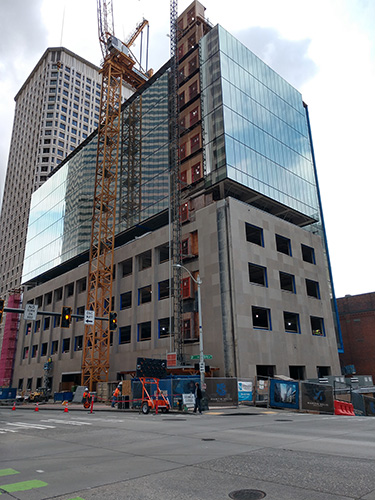|
Subscribe / Renew |
|
|
Contact Us |
|
| ► Subscribe to our Free Weekly Newsletter | |
| home | Welcome, sign in or click here to subscribe. | login |
Construction
| |
March 25, 2020
What is an ‘essential workforce'? That's not fully nailed down yet
Journal Construction Editor
“Essential workforce” has quickly become a buzz phrase among construction companies as the state goes into a two-week lockdown at midnight to help contain the coronavirus.
Gov. Jay Inslee on Monday issued the stay-in-place order that restricts all but the essential workforce from going to work and shuts down all non-essential businesses. The $64,000 question is: Exactly which segments of construction are essential?
The order states construction workers can continue working if they “support the construction, operation, inspection, and maintenance of construction sites and construction projects (including housing construction) for all essential facilities, services and projects included in this document, and for residential construction related to emergency repairs and projects that ensure structural integrity.”
Inslee provided a 14-page list of essential industries and critical infrastructure workers that can stay on the job. The list includes plumbers, electricians, exterminators and others who provide services that are necessary to maintaining the safety, sanitation and essential operation of construction projects.
The list also mentioned those who support projects involving needed facilities, transportation, energy, communications, and solid waste and hazardous waste disposal.
The state's largest construction association, the Associated General Contractors of Washington, is seeking clarity from Inslee on what types of construction must stop and what can continue.
“Obviously, there are more questions than answers in this document,” David D'Hondt, AGC of Washington executive vice president, wrote Monday night in a bulletin to members. “There are, however, some exemptions currently in place for construction. We are working with the governor's office on clarity, as most states have completely exempted construction.”
In a follow-up bulletin from the AGC sent yesterday, attorneys Meghan Douris and Ryan Gilchrist of Oles Morrison Rinker & Baker asked what it all means for the Seattle area.
“Those construction projects for Amazon, Google, Microsoft which are integral to supporting the “IT sector,” Sound Transit, WSDOT, SDOT, public-utility districts and residential construction (if structural or emergency repairs are involved) appear to be within the confines of the order,” they wrote. “Commercial construction outside of these specified areas but supporting other essential activities may continue as well, meaning to the extent construction projects for companies such as Amazon, Google and Microsoft support essential work from those owners, appear to be within the activities permitted by the order.
“Commercial construction outside of the identified sectors and residential construction without ongoing repairs, structural issues and/or ‘emergency' repairs remain in the grey area.”
Douris and Gilchrist noted that federal contractors are also exempt, although the federal government has been issuing stop work and/or suspension of work notices.
Last week, the city of Boston became the first major U.S. city to shut down most of its construction sites. It said only essential construction work is permitted during the suspension, including: emergency utility, road or building construction; new utility connections to occupied buildings; construction of health care facilities and shelters; and work to keep occupied residential buildings habitable.
Boston said it will review individual requests for exceptions to the construction moratorium, but only if the projects support increased public health and safety.
It's unclear if Washington's statewide moratorium allows for these types of requests. For now, the stay-at-home restriction is in effect until April 8, but could be extended.
A survey held last week involving 909 AGC members nationwide showed 28% reported that they were ordered to halt work by the government and 11% were ordered to halt future work as a result of the coronavirus.
An op-ed piece that ran yesterday on the Construction Dive website penned by a New York City construction superintendent called for shutting down jobsites. New York state is allowing construction for essential infrastructure, emergency repair and safety reasons.
James Lang, who works for a major general contractor in New York City, said, “I am a superintendent who works in the field daily and I have seen firsthand how some local construction companies in my area are pushing forward on projects that are far from essential and are putting the health and safety of employees and their families, some of whom are already elderly or have underlying conditions, at risk in the name of schedule and profit.
“We need government officials, whether at a state or national level, to clearly define what types of construction work should be continuing,” Lang said. “Having a new coffee shop, stadium or restaurant is not essential right now and we should not be risking the wellbeing of the people we rely on the most — such as carpenters, plumbers, electricians, laborers etc. — in order to keep owners happy.”
According to Douris and Gilchrist, companies in Washington state that feel their industry is not clearly defined or missing from the list can address that at the state Business Re-Entry Registration website, at https://tinyurl.com/WA-BRR.
“In the current climate — everyone must work together in order for life to resume in a semblance of what we were all accustomed. But that does not mean that those in the industry can ignore their contract terms and you must track the impacts to sort out where things stand when we do come out on the other side of it all,” Douris and Gilchrist wrote.
Benjamin Minnick can be
reached by email or by phone
at (206) 622-8272.



